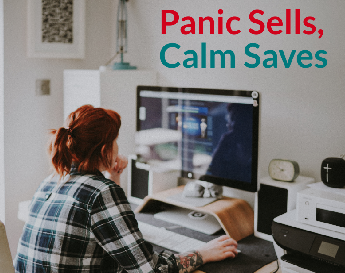Panic Sells, Calm Saves
Panic Sells, Calm Saves

Checking my email last night, I noticed that “coronavirus” appeared in the subject line of about 70% of the messages. It makes sense that the Wall Street Journal, CNN, Fox News, and The Washington Post would be featuring stories, but Wired and The Atlantic and other newsletters have all caught COVID-19 fever. The media are turning this into a payday. I don’t begrudge them that. Panic sells. It’s good business.
The fever is spreading. Now 90% of my emails—including one from my employer—are about coronavirus. The homepage of the three major cable media outlets boast headlines like “New outbreak clusters spark alarm,” and “Trump gives ‘incoherent’ briefing on coronavirus, contradicts CDC.” It’s like we’ve taken one giant leap toward I Am Legend overnight. At least that’s what the media would like you to believe.
Surviving the outbreak of COVID-19 will require us to remain calm, not to succumb to panic, emotional reasoning, or other common cognitive mistakes. Knowing the facts and remembering what you’ve been taught about staying healthy will increase all our chances of staying well.
Three popular sources of information—traditional media, politicians, and social media—can give mixed messages about the true nature of coronavirus.
Since traditional media are supported by ad revenue, they are driven to sensationalize. While they supposedly rely on confirmed information from sources, we’ve all heard, “While we’ve not yet been able to confirm this, there are reports that …” We must also be aware that media outlets, to beat their competitors, occasionally engage in pure speculation.
Politicians are driven by elections, polls, and party. Especially in these politically divided times, hot-button issues like the coronavirus are easily co-opted by elected and appointed officials for their gain.
When it comes to information, social media is the untamed badlands. Even if people are quoting reliable sources, their comments often detract from the usefulness of the content. Also, the conflict and cognitive errors that occur on most popular social media platforms make them poor sources of good information.
To manage your anxiety about coronavirus, here’s what you should know:
- Most people with the coronavirus have relatively mild symptoms.
- Symptoms appear between two and 14 days from exposure to the virus and start much like the common cold.
- Coronavirus is fatal in about two to three percent of cases.
- To stay healthy, here’s what you should do:
- Wash your hands with warm water and soap for at least 20 seconds.
- Use alcohol-based hand sanitizers as a substitute for washing your hands, but do so sparingly.
- Cover your coughs and sneezes.
- Frequently disinfect surfaces, like your desk, phone, tablet, smartphone, and countertops.
- If you are sick, stay home.
- Follow instructions from your kids’ schools on when to keep them home.
- Have contingency plans for school or office closures, including childcare and working from home.
- Be able to prepare meals at home without having to shop for several days.
- Have emergency bags for everyone in your home. The American Red Cross and the Centers for Disease Control and Prevention have lists of what you should pack.
- Limit your media exposure and trust sources that are not supported by advertisements or subscriptions. CDC.gov is a good resource.
If you need more information, call your doctor.
The safest way through the coronavirus and any other outbreak is staying healthy and well-informed.
Co-written by David Cennimo, MD, FACP, FAAP, FIDSA. Dr. Cennimo is currently practicing clinical infectious diseases and infection control while an Assistant Professor at Rutgers NJMS. He is a graduate of the Rutgers New Jersey Medical School where he also trained in a combined Internal Medicine and Pediatrics residency, served as medicine chief resident, and then completed fellowships in both adult and pediatric Infectious Diseases.












